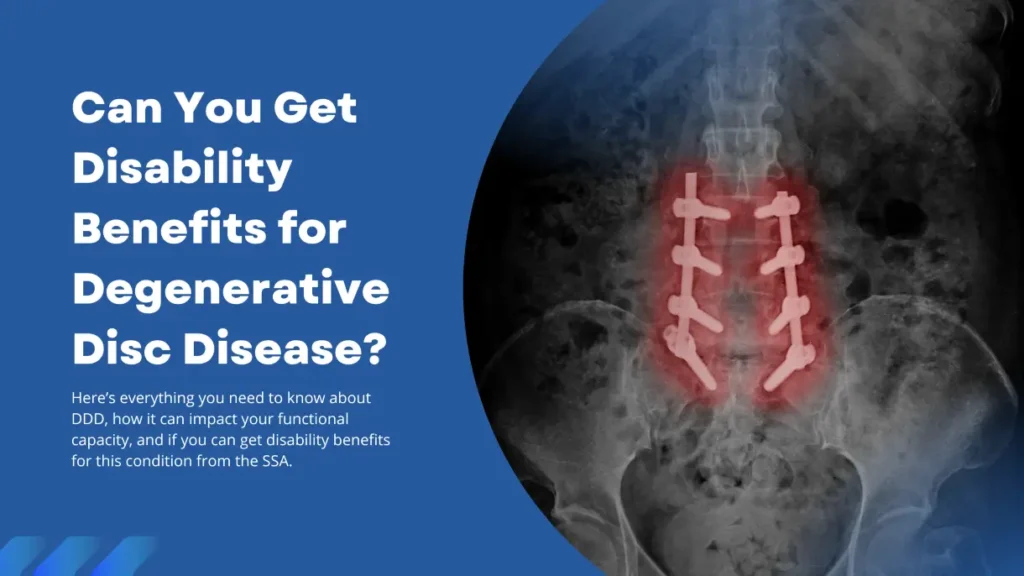Living with degenerative disc disease can be incredibly challenging, impacting your daily activities and overall quality of life. This condition can cause significant pain and mobility issues, leading many to wonder if they can receive Social Security disability benefits. Understanding whether degenerative disc disease qualifies for disability is crucial for those affected. This guide provides clear, factual information to help you navigate the process and determine your eligibility for disability benefits. By the end, you’ll have a comprehensive understanding of how degenerative disc disease intersects with disability claims.
Ready to see if you may qualify? Click here to get a FREE, no-obligation consultation before starting your claim.
Getting Social Security Disability for Degenerative Disc Disease: Key Takeaways
- Individuals with DDD can qualify for long-term disability if it prevents them from working.
- Symptoms like pain, numbness, and weakness are key factors in the disability claim.
- Medical evidence, such as MRI and X-rays, is crucial for approval.
- Legal assistance from an experienced disability attorney can improve the chances of a successful claim.
- SSDI benefits require detailed medical records and proof of inability to work.
- SSI benefits need both medical documentation and evidence of financial need.
What is Degenerative Disc Disease? Symptoms and Side Effects
Degenerative disc disease (DDD) occurs when the intervertebral discs, which act as cushions between the bones of the spine, become dehydrated and shrink. This degeneration is a natural part of aging but can lead to significant pain and discomfort. Symptoms of DDD include chronic back pain, numbness, tingling, and weakness, which can radiate to the arms and legs.
As the discs deteriorate, they may cause the vertebrae to rub against each other or compress nearby nerves, leading to further complications such as herniated discs, spinal stenosis, and spondylosis. These issues often affect the cervical and lumbar spines, potentially impacting nerve roots and resulting in various neurological symptoms and functional limitations. These symptoms can severely impact daily activities and overall quality of life, making it difficult for individuals to perform routine tasks and maintain employment.
Complications From Degenerated or Desiccated Discs
Complications from degenerative disc disease (DDD) can exacerbate its symptoms and lead to additional health issues. Endplate sclerosis, which is the hardening of the tissue surrounding the disc, and retrolisthesis, where a vertebra slips behind a disc, are common complications. Multilevel spondylosis, the degeneration of several vertebrae along the spine, can also occur.
These conditions can lead to severe pain and functional limitations that may require someone to stop working and go on SSI or SSDI. Spinal stenosis, the narrowing of the spinal canal, is another complication that can compress nerves and compromise the nerve root, causing significant mobility issues. Recognizing these complications helps in understanding the full impact of DDD on an individual’s health and daily life.
Is Degenerative Disc Disease a Disability According to the SSA?
Yes, the Social Security Administration (SSA) considers degenerative disc disease (DDD) a disability if it meets specific criteria. Applicants must provide comprehensive medical documentation demonstrating significant limitations caused by DDD. This includes evidence of chronic pain, numbness, muscle weakness, and reduced mobility.
The condition must prevent the individual from performing substantial gainful activity for at least 12 months. Detailed medical records, diagnostic tests, and functional assessments are essential to prove the severity of the condition and its impact on the applicant’s ability to work.
SSA Disability Requirements for Spinal Disorders
The SSA’s listing for spinal disorders, particularly under listing 1.15, outlines the requirements for qualifying disabilities. To meet this listing, applicants must present medical documentation of pain, numbness, and muscle weakness affecting nerve roots. Diagnostic tests, such as MRI or CT scans, must show disc degeneration impinging on nerves.
Additionally, there should be proof of significant mobility issues, such as the inability to walk without assistance or perform fine and gross motor skills with the upper extremities. These criteria are part of the broader category of musculoskeletal disorders, which include various conditions affecting the skeletal spine and limbs. Meeting these stringent criteria can be challenging, necessitating thorough and precise medical evidence to establish the severity and functional limitations caused by DDD.
Does Your RFC Mean There’s No Work You Can Do?
Your Residual Functional Capacity (RFC) evaluates your ability to perform work activities despite your limitations. A thorough physical examination is essential in diagnosing musculoskeletal disorders like degenerative disc disease (DDD) and establishing objective medical evidence of your condition. If DDD restricts you from performing any type of job, this can qualify you for disability benefits.
The SSA assesses your ability to lift, stand, sit, and perform repetitive tasks. If DDD impairs these functions significantly, proving that you cannot return to your previous work or any other work in the national economy is crucial. Comprehensive medical records and functional assessments help establish the extent of your limitations and support your disability claim.
Chronic Pain and Proving Back Disabilities
Chronic pain from degenerative disc disease must be well-documented to prove a disability claim. Consistent medical records, detailed physician statements, and a thorough treatment history are essential. Degenerative disc disease pain can significantly impact daily activities and work capabilities, and showing this through comprehensive documentation strengthens your claim. Descriptions of how pain affects your ability to perform basic tasks and maintain employment are crucial in demonstrating the severity of your condition and its disabling effects.
How Hard Is It to Get Disability for Degenerative Disc Disease?
Securing disability benefits for degenerative disc disease (DDD) can be challenging due to the stringent requirements set by the SSA. Comprehensive medical documentation is essential, including detailed records of symptoms, treatments, and diagnostic tests like MRI and X-rays. Applicants must demonstrate that their condition severely limits their ability to perform work-related activities.
Regular medical treatment and consistent physician reports strengthen the claim. A disability attorney can also improve the chances of approval by gathering necessary medical evidence, preparing documentation for appeals, and understanding the legal rights of clients. Legal assistance ensures all necessary documentation is provided and the application process is thoroughly followed. Understanding SSA requirements and preparing meticulously can significantly enhance the likelihood of a successful claim.
Which Degenerative Disc Disease Symptoms Might Limit Your Ability to Work?
Degenerative disc disease (DDD) can severely impact your ability to work due to various debilitating symptoms. The degeneration of spinal discs can lead to chronic back pain, making it difficult to perform physical tasks or maintain a consistent work schedule. Numbness and tingling can radiate to the arms and legs, further limiting mobility and dexterity. Weakness in the muscles can make lifting, standing, or sitting for prolonged periods challenging.
These symptoms can disrupt focus and productivity, making it hard to perform even sedentary jobs. Properly documenting how these symptoms affect your work activities is crucial for a successful disability claim.
Other Medical Conditions & Comorbitites That May Help You Get Disability for Degenerative Disc Disease
Other medical conditions often accompany degenerative disc disease, potentially strengthening your disability claim. Conditions like endplate sclerosis, retrolisthesis, and multilevel spondylosis are common comorbidities that exacerbate DDD symptoms. Additionally, spinal stenosis, which involves the narrowing of the spinal canal, can lead to severe nerve compression and pressure on the spinal cord, resulting in further mobility issues and neurological dysfunction.
Including these conditions in your disability application provides a comprehensive view of your health challenges. Detailed medical records and physician statements about these comorbidities can support your case by illustrating the compounded limitations affecting your ability to work.
Medical Evidence You’ll Need for Your Degenerative Disc Disease Disability Claim
Medical evidence is crucial for a DDD disability claim. This includes a comprehensive medical history, medical records, diagnostic tests, and physician statements. Here’s a look at what you need to improve your odds of approval:
Medical Records
Comprehensive medical records detailing your DDD diagnosis, symptoms, and treatment are essential. These records should show a consistent history of your condition and its progression over time. They must include notes from doctor visits, physical exams, and any prescribed treatments or therapies, such as physical therapy. Consistent documentation of your symptoms and their impact on your daily life strengthens your disability claim.
Medical Evidence
Diagnostic tests like MRI, X-rays, and CT scans provide objective evidence of disc degeneration and nerve involvement. These tests are critical in proving the severity of your condition. Detailed reports from these imaging tests should highlight the extent of the disc damage and its impact on your spinal health. Such evidence is vital in establishing the medical basis for your disability claim. During the appeals process, an administrative law judge may review this medical evidence and consult with medical and vocational experts to decide on the claim’s approval.
Evidence that Work Triggers Your Symptoms
Documentation showing that work activities exacerbate your symptoms strengthens your claim. This can include physician notes, workplace assessments, and personal statements. Evidence that specific job duties trigger pain, numbness, or weakness is crucial. Providing detailed accounts of how work tasks affect your condition can help demonstrate the practical limitations imposed by DDD, supporting your case for disability benefits.
Proof of Other Conditions
Including evidence of comorbid conditions such as endplate sclerosis or spinal stenosis can support your claim by demonstrating additional limitations and complications. Medical documentation of these related conditions provides a comprehensive view of your health status. Detailed records showing how these comorbidities interact with DDD to worsen symptoms and restrict your ability to work can significantly bolster your disability claim.
How to Apply for Degenerative Disc Disease Disability Benefits
Applying for social security disability benefits involves submitting detailed medical documentation and proving severe limitations caused by degenerative disc disease. This includes demonstrating the impact on your ability to work and meet SSA criteria.
Applying for Social Security Disability Insurance (SSDI) With Degenerative Disc Disease
To apply for SSDI, gather all necessary medical documentation and complete the online application at ssa.gov. Ensure your records clearly show the impact of DDD on your ability to work. Detailed medical evidence, including diagnostic tests and physician statements, is essential.
The application process can be complex, so consider consulting a disability lawyer to help navigate the system and improve your chances of approval. Regularly update your medical records to reflect ongoing symptoms and treatments, which will support your case during the review process. SSDI benefits range from $100 to $3,822 per month, depending on your previous earnings, though the average monthly payment is around $1,537.
Applying for Supplemental Security Income (SSI) With Degenerative Disc Disease
For SSI, begin your application online and complete it with a Social Security representative. Detailed medical records and proof of financial need are required for approval. SSI benefits are needs-based, so you must demonstrate both the severity of your condition and your limited financial resources. Comprehensive documentation, including diagnostic tests and physician statements, is crucial.
Working with a disability lawyer can help ensure that all necessary information is included and that the application is properly completed. Regularly updating your medical records and maintaining clear communication with your healthcare providers can strengthen your application. SSI benefits can provide up to $943 per month for individuals, with additional amounts available for eligible couples.
Work With a Disability Lawyer to Improve Your Odds of Approval
Working with an experienced disability attorney can significantly improve your chances of securing disability benefits for degenerative disc disease. Attorneys specializing in disability claims can help gather necessary medical evidence, complete applications accurately, and navigate the appeals process if your initial claim is denied.
Statistics show that applicants represented by attorneys are nearly three times more likely to be approved for benefits compared to those who apply without legal assistance. An experienced disability attorney ensures that your application is thorough and that all documentation meets SSA requirements, increasing the likelihood of a successful claim.
Ready to see if you may qualify? Click here to get a FREE, no-obligation consultation before starting your claim.

